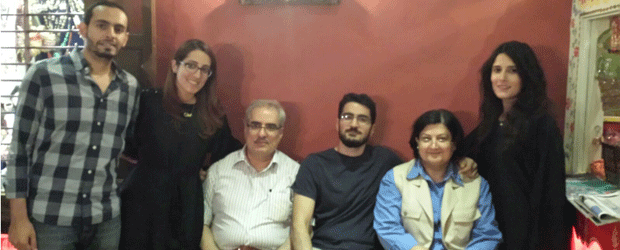Bahrain: Wa’ad calls for solidarity against its dissolution
[vc_row][vc_column][vc_column_text]

Ebrahim Sharif, third from left, Farida Ghulam, second from left, and family.
Farida Ghulam, the wife of Ebrahim Sharif, the former secretary-general of Bahraini opposition group National Democratic Action Society (Wa’ad), has written an open letter to political and human rights institutions worldwide calling for solidarity against the dissolution of Wa’ad.
Written on behalf of the secular political party, Ghulam’s letter asks for national figures, Arab organisations and international institutions to help “protect the little remaining freedoms enjoyed by Bahrainis that have been undermined over the past few years”.
On 6 March 2017, the Ministry of Justice filed a lawsuit calling for the dissolution of Wa’ad following a statement made by the political societies of the National Democratic Movement, a secular group of which Wa’ad is a part, demanding a “comprehensive national consensus to end the political and constitutional crisis” in Bahrain.
The Ministry of Justice, the body administratively responsible for political organisations in Bahrain, has accused Wa’ad of “advocating violence” and supporting an “environment that incubates terrorism”, arguing that statements made by the political societies represented a departure from established principles.
The first hearing of the case against Wa’ad took place on the 20 March 2017 and the final hearing is scheduled for the 17 April 2017, with a judgment expected to be passed within one month.
The time of the comments made by the National Democratic Movement marks six years since the end of the pro-democracy movement in Bahrain, which saw numerous protests take place in opposition to the repressive government.
The authorities’ retaliation to the peaceful demonstrations of its citizens resulted in the injury of more than 30 protesters. Recent years have seen an increase in government repression, arrests — with many tried in military courts — and revocation of citizenship for hundreds of Bahrainis.
The US State Department has recorded the continued violation of human rights in the Arab nation and the Bahraini authorities’ preferred use of security measures over the pursuit of diplomatic solutions obtained through a negotiated political settlement. The political climate in Bahrain has led to increased hardships for the country’s citizens, amplified by an economic crisis.
Wa’ad, the first established secular party opposition in Bahrain, questions the legitimacy of the current Bahraini constitution. It upholds the principles of democracy, equality and freedom of thought and belief. Despite its failure to win any seats in the 2006 parliamentary elections, Wa’ad, led by Sharif between 2005 and 2012, has retained a high media profile.
Ghulam’s letter indicates that the Ministry of Justice has purposely failed to refer to key documents, statements and positions taken by Wa’ad and other opposition groups in building its case, including the Manama Document issued in October 2011 and the Declaration of Principles of Nonviolence presented in November 2012. This confirms Wa’ad’s commitment to “peaceful means, rejection of violence and adoption of dialogue and consensus building to find solutions in political differences”.
Ghulam also says that the authorities have taken and interpreted words from Wa’ad statements “at will and out of context”.
Actions taken by the Bahraini authorities to dissolve Wa’ad follow their crackdown on opposition parties since the mass protests of 2011, with two other opposition groups dissolved as a result of similar lawsuits. Islamic Action Association (Amal) was brought to an end in 2012 and its secretary-general, Sheikh Mohammed Ali Almahfood, was given a five-year prison sentence. 2016 saw the dissolution of the nation’s largest political organisation, Al-Wefaq National Islamic Society. Secretary-general Sheikh Ali Salman was sentenced to nine years in prison. The citizenship of the group’s spiritual leader, Sheikh Isa Qasim, was also revoked.
In addition to actions taken against Wa’ad, new charges were also brought against Sharif earlier this month following a series of tweets. The political activist was charged with “incitement to hatred against the regime” under article 165 of Bahrain’s penal code following messages posted on his Twitter account.
The former Wa’ad leader was imprisoned and tortured in 2011 for his role in campaigning against Bahrain’s political regime alongside a group of other human rights advocates known as the Bahrain 13. He was rearrested in 2015 a few weeks after his initial release, following a speech where he called for sustained peaceful opposition against the country’s authorities.
Sharif also faced charges in November 2016 after comments he made to the Associated Press regarding Prince Charles’ visit to Bahrain, although these were later dropped. He now faces a further three years in prison.
[/vc_column_text][/vc_column][/vc_row][vc_row][vc_column][vc_basic_grid post_type=”post” max_items=”4″ element_width=”6″ grid_id=”vc_gid:1492096403121-1bd99655-9b6e-3″ taxonomies=”716″][/vc_column][/vc_row]
